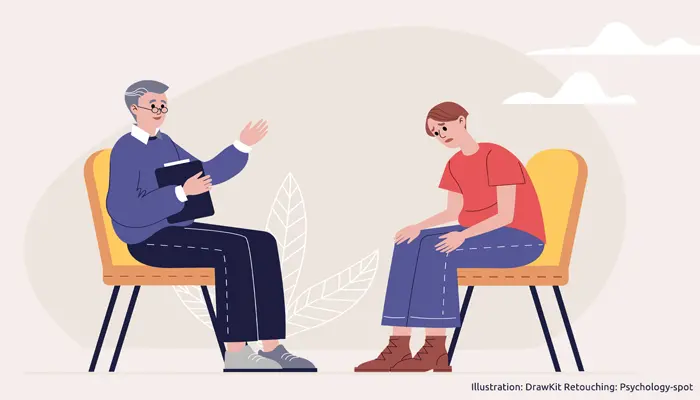
Experiences with psychologists are not always as positive, developing and illuminating as we would like or as they should be. Even though “Psychology is a manual for your own mind,” as Daniel Goldstein said, if we choose the wrong professional, we can end up more confused than we started.
A necessary parenthesis: The therapy boom
Psychotherapy is more popular than ever. Public figures have shared their experiences with psychologists and recommend them to everyone. Friends and family who would not have dared to confess it a few years ago now openly acknowledge that they are in therapy. And among the youngest it is even becoming a kind of “fashion”.
As awareness grows about the importance of taking care of mental health and we dispel stigmas about psychotherapy, more people are turning to it as an essential self-care tool. And there is nothing wrong with that.
In fact, we can all benefit from the right therapy at the right time. However, it is no less true that this search – sometimes even frantic – for treatment can lead us to have bad experiences with psychologists. Therapy can also do harm – a lot.
As a rule, when a person goes to therapy assumes that he will come out better or that he will at least be able to untangle his psychological knots. However, Viktor Frankl referred to iatrogenic neuroses to refer to a psychological discomfort in which the psychologist or psychiatrist has been responsible for providing the pathogenic factor.
Inadequate psychotherapy can be worse than not going to therapy because the psychologist could stop the natural healing process. Bad therapy can even be iatrogenic; That is, it could retraumatize us or cause new psychological damage.
The good news is that you can learn to recognize the signs that the process is not flowing as it should. The fact that you have had bad experiences with psychologists does not mean that therapy is useless or that it will happen to you again. If you need help, it is important that you seek it, but taking some precautions.
The most common reasons for bad experiences with psychologists
As a general rule, most “bad therapists” are not bad people. That is, they do not harm patients on purpose. In reality, psychotherapy is an extremely complex process in which not only extensive academic training is needed but also a personal willingness to connect with the suffering of another and understand its cause. It may seem simple, but it is not.
On the other hand, psychologists and psychiatrists must also be able to leave their emotional baggage out of the consultation. If they do not, their beliefs, stereotypes, and even expectations are likely to negatively influence the therapeutic process.
There are thousands of reasons why the therapeutic process can derail leading to a bad experience, but the most common are:
1. Lack of ethics. In every profession there are bad apples. Psychology and Psychiatry are no exception. Although there is a strict code of ethics in the field of mental health, there may be professionals who do not follow it and put their needs before those of their patientes, prolonging treatment unnecessarily, violating confidentiality or even maintaining intimate relationships. There is no doubt that a lack of ethics can compromise the effectiveness of therapy and generate very negative experiences.
2. Inappropriate therapeutic approach. There are many types of therapy, and not all of them are suitable for dealing with the different psychological problems. Some of the bad experiences with psychologists come precisely from the wrong choice of therapeutic approach, either because people do not feel comfortable with it or it is not useful to them. For example, if someone suffers from obsessive/compulsive disorder, they may need full-fledged cognitive-behavioral treatment and not just a few counseling sessions. The choice of therapeutic approach is often essential for the success of the therapy and for meeting the demands of patients, adapting to their needs, preferences and personality.
3. Poor preparation of the therapist. The human mind is vast and complex, so there are many tools and methods to address the different problems and conflicts that may arise. As a rule, when therapists venture into terrain they have never explored, they may make mistakes along the way due to their lack of experience and training. For this reason, it is better to choose specialized professionals with years of experience.
4. Lack of connection. Telling our problems to a person we don’t know at all can be a challenge. For this reason, it is essential that the therapist be able to create a space of acceptance and validation in which their clients feel comfortable expressing themselves. However, sometimes this connection is not produced. The absence of this psychological and emotional attunement may be due to an inability of the psychologist or psychiatrist to connect, but also to causes beyond his control. At the end of the day, just because someone is a good psychologist doesn’t mean they’re necessarily good for you. In many cases, this lack of connection is perceived as misunderstanding or judgment on the part of the therapist, which inhibits communication and prevents progress, generating a bad experience with the treatment.
5. Unreasonable expectations. We don’t go to therapy alone, we bring our expectations. In fact, one of the first steps of psychological treatment consists precisely of adjusting patients’ unrealistic expectations so that they better understand what they are facing and what they can expect from the process they are about to begin. However, sometimes this process can fail, either due to the psychologist’s ineptitude or because the patient’s expectations were too resistant. For example, if you expected psychological therapy to be like a visit to the doctor, you may have been disappointed to learn that you must take an active role and that the psychologist will not tell you what to do.
Any of these reasons can generate a bad experience with the psychologist or therapy. Sometimes “guilt” lies with the professional, on other occasions they are simply not the right person, but in that case, they should have the necessary humility to refer the patient to another psychologist or psychiatrist who can provide more effective treatment.
The elephant on the couch
It is estimated that between 3 and 10% of patients worsen after psychotherapy, according to a meta-analysis conducted at the University of Melbourne. It’s not much, but they are people who suffer and it is necessary to take them into account.
This research also discovered that it is more likely to have bad experiences with a psychologist when interventions that activate too much emotions are applied, especially if the patient is not prepared. There is also the risk of iatrogenicity when the person is blamed or judged, which usually affects the person’s perception of self-efficacy, so that the feelings of helplessness it generates prevent them from improving.
Furthermore, it has been found that excessively long therapies in which the psychologist or psychiatrist allows the patient to remain in his or her “sick role” tend to be less effective because they generate dependency, hinder real progress and hamper the essential recovery of control that allows you to lead a more adaptive life.
How to detect a bad psychologist?
Identifying a bad therapist can be tricky because even effective treatments can make you feel worse before you start to feel better. For example, if you are depressed because you have not fully gone through grief, it is likely that during the first few sessions you will begin to process all that repressed pain. In fact, bringing ignored emotions to light is often part of the therapeutic process and is often a sign that the therapy is working.
It is better to trust your instinct. Do you feel heard? Can you express yourself without fear of being judged? Do you feel a connection with the therapist? Tell him your doubts and concerns and rate how satisfactory your answers are.
It is also important that you inform yourself about the therapeutic approach and delve into the psychologist’s experience and training. In fact, in addition to having a Bachelor’s Degree in Psychology, he/she must be registered and have at least postgraduate studies that have allowed him/her to continue training.
It is important to be particularly attentive because, unfortunately, in the psychological area there is a lot of professional intrusion from people who, with a simple course of a few months, advertise themselves as therapists who can help you solve your problems or change your life.
And remember that you can always request an initial consultation to evaluate your impressions.
In any case, although it is understandable that a bad experience with a psychologist can turn you away from therapy completely, it is important to keep an open mind and not allow a slump to poison your feelings about the entire process, which can really be healing and developing.
References:
Vybíral, Z. et. Al. (2023) Negative experiences in psychotherapy from clients’ perspective: A qualitative meta-analysis. Psychotherapy Research; 10.1080.
Bystedt, S. et. Al. (2014) Clinicians’ Perspectives on Negative Effects of Psychological Treatments. Cogn Behav Ther; 43(4): 319–331.
Berk, M. & Parker, G. (2009) The Elephant on the Couch: Side-Effects of Psychotherapy. Australian & New Zealand Journal of Psychiatry; 43(9): 10.1080.




Leave a Reply